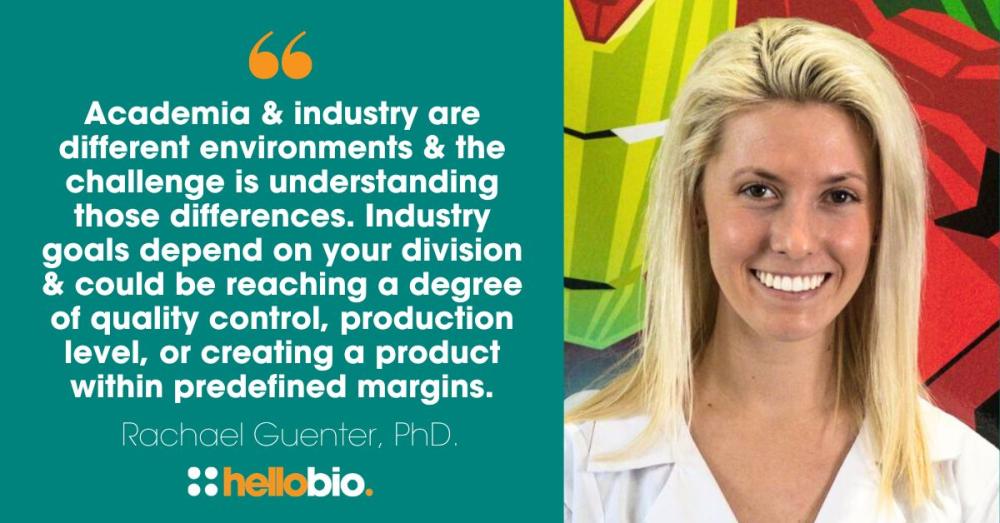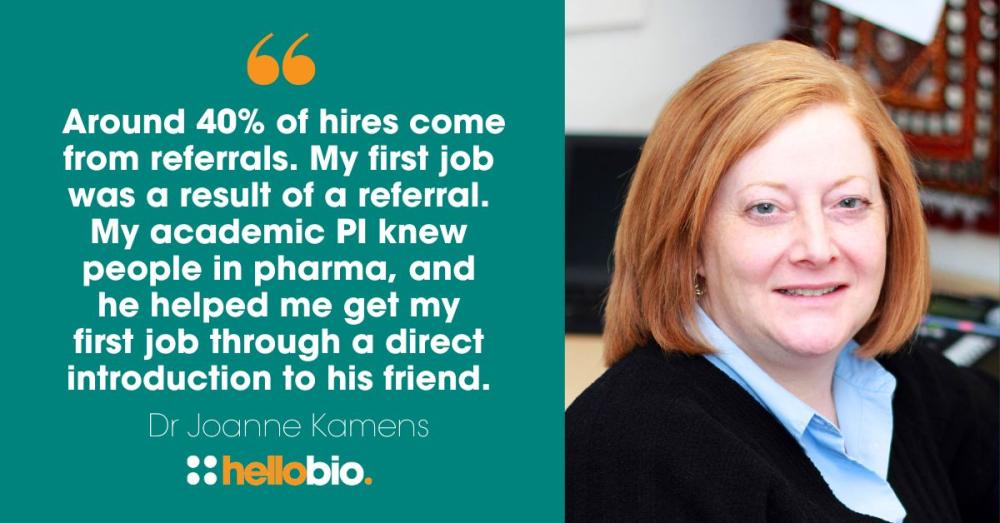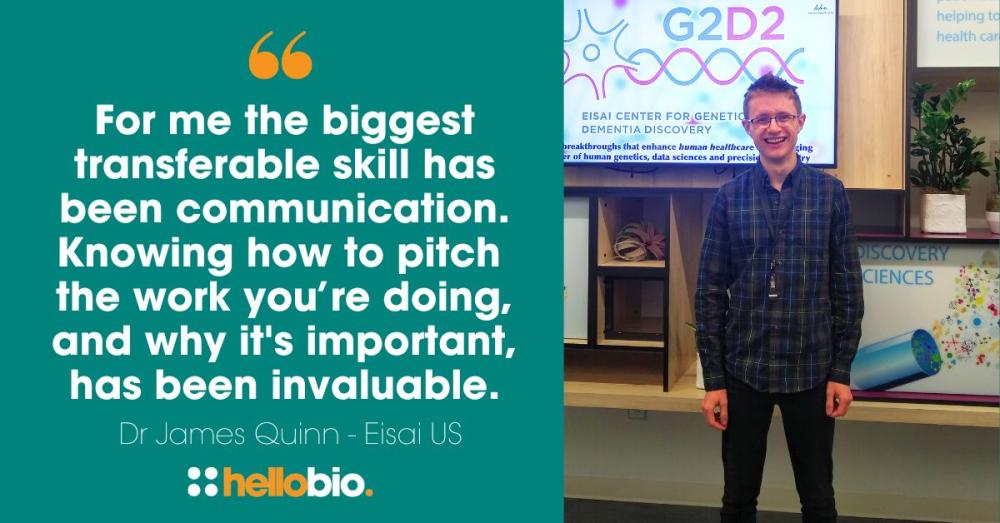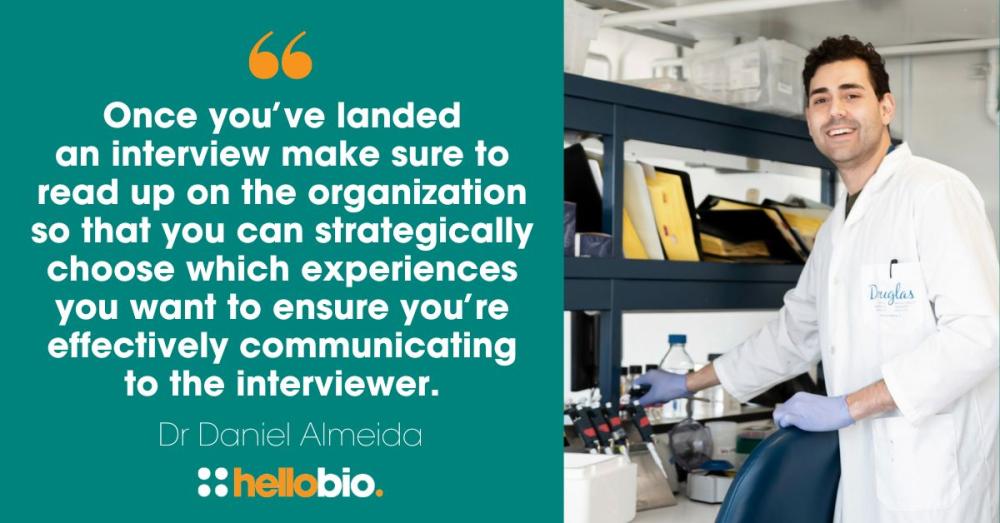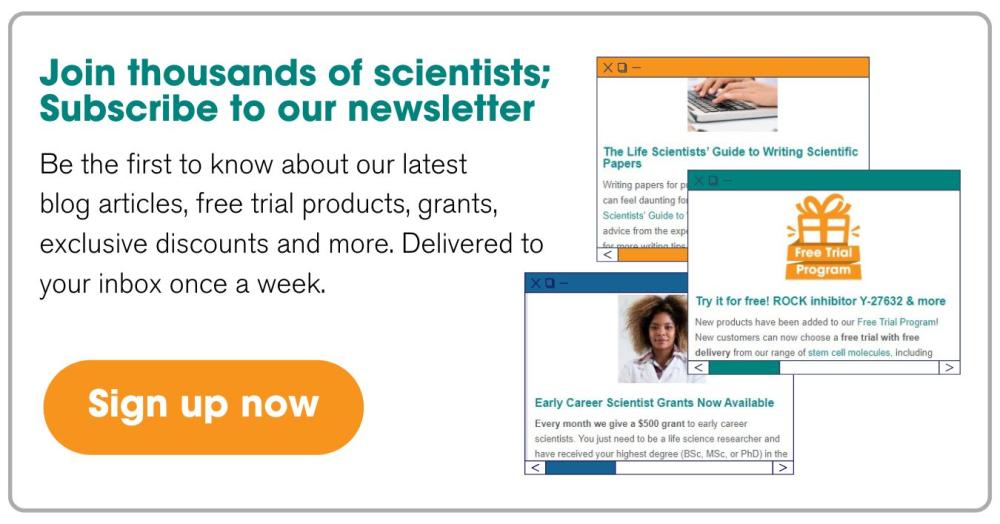The Life Scientists’ Guide to Applying for Jobs in Industry
For many scientists, a role in industry is a long-term goal, and although a move away from academia won’t be right for everyone, there are some great opportunities out there for those who are interested in working in the likes of biotech, pharma or scicomm. From a junior copywriter with a science magazine to a high-level management job at a pharmaceutical company, there are many different roles at all levels of seniority that require various skills.
So what do you need to know when looking for your first industry role? Should you seek a referral or recommendation? Which academic skills will be most valuable in an industry setting? How should you prepare for an interview with a commercial science company?
We asked life science professionals from around the world to share their experiences of transitioning from academia to industry, and they offer some great tips to guarantee success as you take the next step on your STEM career journey. Check out The Life Scientists’ Guide to Applying for Jobs in Industry!
Why apply for a job in industry?
Making the transition from academia to industry has its pros and cons, with both job settings bringing benefits and challenges for its employees. Jobs in industry are generally considered to be better paid, with higher salaries and perks such as bonuses or stock options. Industry roles also tend to offer better conditions and more predictable working hours than academic lab roles, where you might be expected to put in additional hours without the extra pay. Those working in industry often report better access to funding and higher levels of job satisfaction, as well as great opportunities to develop valuable career skills in business, management, communication and entrepreneurship.
Rachael Guenter of the University of Alabama at Birmingham, USA, is a scientist who has worked in both settings. In her interview with us, she shared her experience of transitioning from academia to a commercial role. She said: “Academia and industry are different working environments, but both are important. The main challenge transitioning between the two is understanding the differences between the respective goals. In academia, goals look more like accomplishing experiments for a grant or paper, submitting grants, and publishing peer-reviewed papers. In industry, goals are dependent on your division and could look more like reaching a degree of quality control, production level, or creating a product within predefined margins.”
In his recent interview with us, Andy Billinton of Harness Therapeutics told us why working in industry is a great option for scientists who want to see scientific solutions applied to real-world problems. He said: “If you want to focus more on applied science, then go for it! Working in industry is a great way to see the bigger picture of how the life science ecosystem works.”
Common job roles within industry
Science jobs outside of academia can vary enormously, and the sort of role you might want to apply for will depend on your background, experience and specialism. Roles within pharmaceutical companies, biotech firms or contract research organisations (CROs) are popular, with a focus on developing new products, technologies or therapies for commercial sale. Employees in these types of roles enjoy finding solutions for real-world problems and seeing them applied, but their research topics can be limited and are often set based on market demand. Other non-academic fields of work could include science communication, publishing, working in an education or charity setting, clinical or medical roles, manufacturing and engineering, or data analysis. Here are some of the most common scientific job roles outside of academia:
Research & Product Development
- Research Scientist - Conducting experiments, analysing data, or developing new products for commercial sale
- Principal Investigator - Designing and leading research projects, securing funding and publishing the results
- R&D Manager - Managing development projects and overseeing research teams
- Regulatory Affair Specialist - Checking that new products meet regulatory standards
- Quality Control Analyst - Testing products to ensure they meet quality standards
Customer Service, Manufacturing & Operations
- Technical Sales Specialist - Using scientific knowledge to support sales of technical products or solutions
- Supply Chain & Distribution Manager - Managing the sourcing, production and distribution of products to customers
- Processing Engineer - Developing, organising and overseeing scientific lab manufacturing processes
- Manufacturing Scientist - Overseeing lab production processes, ensuring efficiency and compliance
Clinical & Medical Settings
- Clinical Scientist - Designing and carrying out clinical trials, and analysing data
- Medical Science Liaison - Acting as a bridge between the company and the medical community, providing scientific and clinical information
- Medical Writer - Creating clinical documents and scientific publications
Data Science & Analysis
- Data Analyst - Interpreting complex datasets to inform decision-making processes
- Computational Scientist - Developing and applying data-analytical methods and mathematical modelling techniques
- Behavioural Scientist - Studying human behaviour and developing effective interventions and programs to make positive changes
Communication & Education
- Science Communicator - Explaining scientific concepts to the public through writing, presentations, or other audio/visual media
- Events programmer - Organising science events and conferences, selecting and booking guest speakers, dealing with logistics
- Publishing editor - Commissioning, selecting and editing articles to be published in scientific journals or magazines
- Education Coordinator - Developing educational programs and materials, running workshops
- Training Specialist - Training staff or customers on scientific products or processes
Where should you look for jobs in industry?
When it comes to finding out about the latest vacancies in industry, there are various approaches you can take to explore the available options. From traditional job advertisements and recruitment agencies to social media and networking, be sure to cast your net wide when job-seeking outside of academia.
Networking
Building professional networks with other scientists is crucial for putting out the feelers and finding out about positions that might be suitable for you. This is something most scientists will start doing early on in their academic careers, because the more connections you can make ahead of time, the more opportunities you’ll potentially have when you’re ready to look for a new position. For more in-depth advice on networking, take a look at this guest blog by Dr Elodie Chabrol: Mastering Networking for Science: How To Boost Your Profile
Many job opportunities arise from referrals from former work colleagues who have moved on to new roles and will recommend you for job vacancies as they arise. Staying connected and keeping people updated with your current employment status is essential for this, so be sure you have an accurate and up-to-date online presence to let your network know where you’re at and if you might be open to new opportunities.
In the guest blog STEM Career Paths for Life Scientists by Dr Joanne Kamens, she told us how personal contacts were key to her obtaining several roles within industry. She said: “My first job was a result of a referral. My academic PI knew people in the pharma industry, and he helped me get my first job through direct introduction to his friend. My second job came about when I was hired by someone who I had worked with and known for almost a decade. When I went to Addgene it was both a referral and a direct contact. I recently joined a consulting firm with people that I've been working with for 10 years on diversity initiatives for women in STEM entrepreneurship. Relationships lead to job opportunities, in fact around 40% of hires come from referrals.”
Rachael Guenter agrees that networking is key to getting your foot in the industry door. She told us: “Talk to as many people as you can in industry. This can be a casual conversation or a formal interview, but by communicating with people working in industry, you'll learn more about what it's like and it will help you build connections.”
Social media
Many job opportunities are shared through social media platforms such as LinkedIn and X(Twitter). Use these platforms to reach out to people already working at the kind of companies you’re interested in and don’t be afraid to ask for advice. Sign up to groups and smaller networks within these platforms to access more specific information, such as the Pharma & Medical Network on LinkedIn which shares details about jobs and events in the fields of biotech, healthcare and pharma.
Dr Daniel Almeida works in applied behavioural science in a government context, and in his recent interview with us he shared some great tips on using LinkedIn to find industry career advice and opportunities. He told us: “Consider using LinkedIn to find professionals who are already working in the space that you’re interested in breaking into. If you’re like me and enjoy networking, setting up a few informational interviews might be in your best interest. When I did this, I was pleasantly surprised by the many professionals who offered to review my CV/resume. If networking is not something you enjoy, another option would be to see how these professionals describe their skill sets and experiences on their LinkedIn profile. What this will help you do is understand any field-specific terminology that you might want to incorporate in your CV/resume and cover letter.”
Jobs boards & databases
You’ll find lots of specialist science jobs boards and databases online which you can use to search for the most recent vacancies posted. Consider also signing up with a recruitment agency who can match your particular skill set with a specific company who may be looking to recruit.
Here is a selection of specialist websites for science industry job-seekers:
- PharmiWeb.jobs - global life science job listings
- PharmaJobs - jobs and career advice for the UK-based science industry
- MSI Pharma - experts in global life science recruitment
- Science Careers - jobs board from the journal Science and AAAS
- BIG STEM Communicators Network - UK-based scicomm network with jobs board
- HealthJobsUK - vacancies in health science services in the UK
Most individual companies will also advertise job vacancies directly on their websites. Be sure to sign up for any alerts or notifications from companies who will contact you directly when new positions become available.
Which skills do you need to succeed in industry?
The skills you’ll need to demonstrate in order to secure a job in industry will vary depending on the role you’re applying for. However, there are a number of transferable skills which are commonly thought to be most useful when moving away from academia. Before you apply for any new role, take some time to consider where your strengths and weaknesses lie and which type of position would be a good match for your skill set.
In her most recent interview with us, science writer Dr Lucka Bibic explained why focusing on the activities you enjoy the most is a great place to start when considering job roles outside of academia. She told us: “It’s all about skills. My first suggestion would be to look into your academic curriculum and try to identify your current core competencies. Ask yourself questions such as, ‘What are my personal strengths? What do I enjoy doing at work the most?’. Then, try to think of industries, professions, and positions where these particular skills are wanted, and map them together with your core competencies. Maybe even discuss that map with your colleagues and your friends in industry as a sanity check.”
Dr James Quinn is a Translational Neuroscientist who specialises in dementia research. In October 2022 he transitioned away from a postdoc role at Massachusetts General Hospital to an industry role with Eisai US (G2D2). He told us why his communication and problem-solving skills have been invaluable in his new role: “For me the biggest transferable skill by far has been communication. In this role I’m presenting multiple times a week to many different people all around the world, from scientists to directors. Knowing how to pitch the work you’re doing, and why it's important, has been invaluable. This is something I had honed a little during my time in academia, as well as the ability to just crack on with a problem. I’ve been utilizing my problem-solving skills almost daily!”
James added that sticking with ‘what you know’ will give you your best chance of finding a good match and ensuring that your new role has the potential to be a long-term arrangement. He said: “I had worked on neurodegenerative diseases since my undergrad, so these were the types of industry roles that I applied for which definitely made the application process easier. If you do want to branch out into a different field, I highly recommend trying to get some experience in that area first, like an internship for example. I tried this with consulting and quickly realized that it wasn't for me!”
If you’re not confident that your industry skills are quite up to scratch just yet, another option is to look for a postdoc role within an industry setting. Danielle Tomasello of The Social Scientist spoke about non-academic career options during a panel discussion at the Hello Bio LabLife Conference 2024. She explained how a colleague took an industry postdoc route and it ended up being a great fit for him. She said: “I had a friend who was interested in working in industry, but was having a hard time making the step up from his PhD. He ended up doing a postdoc within an industry setting, and although this meant he wasn’t enjoying the financial benefits of a full role with the company, as soon as the postdoc was finished he was able to climb the ladder much more quickly than if he had gone there directly. It was perfect for him because he was also able to publish papers, so he was able to continue with a slightly more academic mindset, yet in the long-term it really increased his industry career prospects.”
Tailoring your CV to industry
Once you’ve identified your relevant skills it’s important to shout about them in your CV. Be sure to tailor your resume so that it highlights the qualifications and achievements that will impress an industry employer. Emphasise any results or published papers that might be relevant to the job role, and highlight the impact of your previous work. Try to use industry-specific language and keywords where possible, and make it clear that you understand how academic and industry job roles can differ.
Keeping track of your applications
If you’re applying for a number of different vacancies, get ahead of the game by keeping a database of the essential information you’ll need if things progress further. James Quinn told us: “Set up a Google document or Excel spreadsheet to track all the jobs you’ve applied for, dates of application, name of hiring manager, any crucial deadlines, the next steps, and any specific notes about the role etc. I found this so helpful to refer to when I needed to figure out who was calling me and wanted to set up the next stage of the interview process.”
Preparing for an industry interview
If you’re invited to the interview stage of a job application, much of the same advice above will apply. Be ready to explain why you want to work in industry and make sure you’re able to demonstrate that you have the right mindset for a commercial science role that’s likely to be more product-focused. As with any type of interview, do as much research as you can on the company, their ethos and what they might be looking for in an applicant.
Daniel Almeida stresses the importance of thorough research: “Once you’ve landed an interview make sure to read up on the organization so that you can strategically choose which experiences you want to ensure you’re effectively communicating to the interviewer.”
James Quinn told us why it’s vital to show industry employers what your previous work has produced and how your experience will benefit their company. He said: “Academic job interviews tend to involve group presentations (or chalkboards for professorships), conversations with key lab members (including the head) and maybe a social lunch. My industry interview was very similar and I remember it lasting a whole day and having to give talks ranging from 30-60 minutes. My key advice for industry presentations would be to show deliverables - i.e. this piece of work produced a publication, or a grant, or something tangible, and if possible, present projects with translatability or collaborations with industry.”
Step outside your comfort zone
Transitioning away from academia can feel like a huge step for many, but have confidence in your abilities as a scientist and be prepared to grab those opportunities when they come your way. The skills you’ve learned in academia will stand you in good stead to take on new challenges and expand your scientific experiences.
Daniel Almeida said of his STEM journey: “I knew that I wanted to pursue a career where I could leverage the skills I’d developed throughout my academic training but while I enjoyed research, there were aspects of academia that I didn’t think would work for me in the long run. Through personal research and networking, I partnered with Forbes Ignite on a project, and this opportunity introduced me to the field of applied behavioral science. Looking back now, while it certainly was a lot of work, I'm grateful that I remained open-minded and had the confidence to pursue diverse opportunities.”
Ask for support and advice
There will be plenty of opportunities to seek advice from those who’ve been there and made the transition into industry, so reach out to your networks and ask questions. Most will be happy to share their experiences, offer guidance, and even put in a good word for you where appropriate.
Pedro Resende of Chaperone took part in our LabLife Conference panel discussion on STEM careers, and he told us: “For me, these transitions happened early in my career, and I’d invested much time trying to identify and develop transferable skills which made it a little bit easier for me. But the transition from academia to industry is neither a fast, nor easy one to make on your own. Search for career support within your institution. If they do not provide career services, look for companies or freelancers that can help. It’s an investment that is well worth the time and money.”
Career advice and mentoring for life scientists:
- Chaperone - personalised career development services for scientists
- The Social Scientist - one-on-one mentorship for the STEM community
- Sci.STEPS - mentoring program for young scientists
- smartsciencecareer - online community offering career development advice
- BioScience Careers - career development courses and advice
- Nature - careers advice from scientists in industry
Additional resources from Hello Bio
And finally, for more on STEM career options and opportunities, take a look at these articles on the Hello Bio blog:
- We asked our scientists: what’s the best career advice you’ve ever had?
- STEM Career Paths for Life Scientists - guest blog by Dr Joanne Kamens
- Academic vs. Non-Academic Science Careers (and choosing the right path)
- Cultivating a Creative Career in Scicomm - guest blog by Dr Renaud Pourpre
- To Science, or Not To Science? Alternative Careers For PhDs - guest blog by Dr Lucka Bibic
________________________________
If you enjoyed this article, why not check out the other resources available on our blog. We are passionate about supporting life scientists including early career life scientists and PhD students - with really low-priced reagents, antibodies and biochemicals, early career scientist grants, and resources to help with both personal and professional development. We know how tough it is - so we hope you find these helpful!
More General Support for Life Scientists
For advice on wellbeing, dissertations, presenting at conferences, wellbeing, PhD support, networking and lots more, we have a huge range of articles to help - just click below:
Save up to 50% on our high purity reagents...
When you get to the stage of planning your experiments, don't forget that we offer a range of low-cost, high-purity agonists, antagonists, inhibitors, activators, antibodies and fluorescent tools (yes - they really are around half the price of other suppliers!) You can use our Quick Multi-Search Tool to search for lots of products in one go, and the range includes:
- Enzyme inhibitors and activators
- Chemogenetic ligands
- Ion channel modulators
- GPCR & ionotropic receptor ligands
- Cell biology reagents & biochemicals
Technical resources
Try our Molarity Calculator: a quick and easy way to calculate the mass, volume or concentration required for making a solution.
Try our Dilution Calculator: an easy way to work out how to dilute stock solutions of known concentrations
We also offer a comprehensive range of technical resources including antibody protocols and methods, product guides and mini-reviews:
And finally, don't forget to check back in with our blog regularly for our latest articles. If there’s something you’d love to contribute to the community, whether that’s an interview or article, drop us a line at hello@hellobio.com
---






